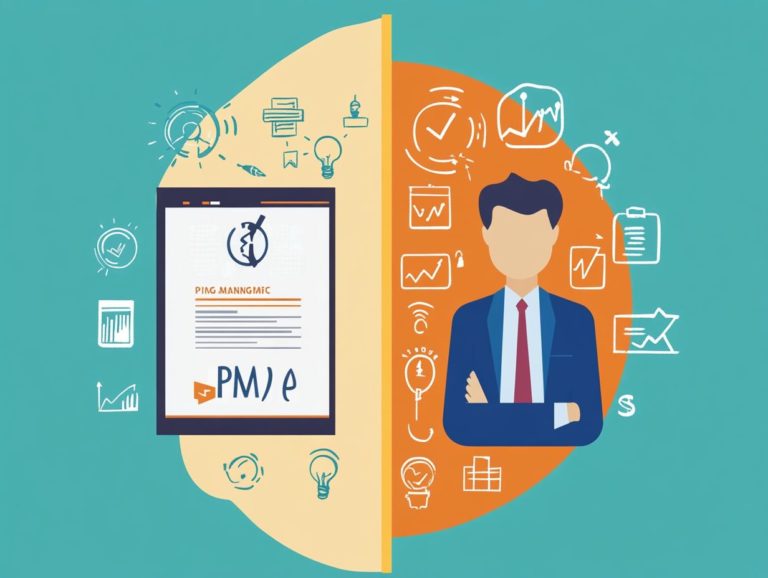5 Reasons to Consider PMI-ACP Certification
In today s fast-paced work environment, agility in project management is essential for success. Discover five exciting reasons to pursue PMI-ACP certification and transform your career!
This article highlights benefits like improved job opportunities and salary potential, showcasing your commitment to professional growth.
You’ll find detailed insights into what the certification involves, the requirements you’ll need to meet, and effective tips for successful exam preparation. Explore how PMI-ACP can elevate your career and give you a competitive edge in the job market.
Contents
- Key Takeaways:
- 1. Demonstrates Agile Knowledge and Skills
- 2. Increases Job Opportunities and Salary Potential
- 3. Provides a Competitive Edge in the Job Market
- 4. Expands Networking Opportunities
- 5. Shows Commitment to Professional Development
- What Is PMI-ACP Certification and How Does It Work?
- Frequently Asked Questions
- What is PMI-ACP Certification?
- Why should I consider PMI-ACP Certification?
- What are the eligibility requirements for PMI-ACP Certification?
- How can I prepare for the PMI-ACP Certification exam?
- What is the format of the PMI-ACP Certification exam?
- What is the passing score for the PMI-ACP Certification exam?
Key Takeaways:
- Gain recognition for your Agile knowledge and skills with PMI-ACP certification.
- Increase job opportunities and salary potential by becoming a certified Agile professional.
- Stand out in the job market with PMI-ACP certification.

1. Demonstrates Agile Knowledge and Skills
Obtaining the PMI-ACP certification is your ticket to demonstrating a solid grasp of Agile methods, equipping you with the essential knowledge and skills to excel in ever-changing project management landscapes.
This certification equips you with core Agile practices like Scrum a framework for managing projects, Lean focusing on efficiency, Kanban visualizing workflow, and Extreme Programming (XP) enhancing software development practices, while also highlighting the crucial role of continuous feedback and adaptability within Agile teams.
By showcasing your proficiency in these approaches, you position yourself as a valuable contributor to project success, enhancing product delivery processes across various organizations.
Having a knowledgeable Scrum Master or Agile Coach on your team dramatically improves communication and cultivates a collaborative atmosphere, ultimately boosting productivity.
These roles guide teams through crucial Agile ceremonies such as daily stand-ups, sprint planning, and retrospectives, ensuring that everyone stays focused and aligned on project goals.
As the competitive landscape continues to shift, organizations that embrace Agile practices are more resilient and responsive to market changes. They re also better equipped to deliver higher-quality products in shorter timeframes, giving them a distinct advantage over their rivals.
2. Increases Job Opportunities and Salary Potential
Achieving the PMI-ACP certification significantly elevates your job opportunities and salary potential as an Agile professional, making you a top candidate in the competitive project management arena.
This globally recognized certification unlocks a variety of Agile roles for you, such as Scrum Master and Agile Coach. In these roles, you can lead transformative projects and guide teams in mastering Agile methods.
Recent statistics show that Agile professionals, particularly those holding the PMI-ACP certification, can experience salary increases of up to 25% or more. In fact, the average Scrum Master in the United States earns around $100,000.
In Dubai, the growing adoption of Agile practices reflects this trend, resulting in a high demand for certified experts and leading to competitive salary packages that attract talent from across the region.
3. Provides a Competitive Edge in the Job Market
In today’s job market, obtaining the PMI-ACP certification gives you a significant competitive edge, highlighting your dedication to mastering Agile methods. To further boost your credentials, consider these 5 ways to enhance your PM certification experience that can drive project success.
This unique qualification not only enhances your expertise but also sets you apart from peers who may lack formal Agile training, making you more appealing to potential employers.
A strong understanding of Agile tools enables you to manage projects effectively, ensuring timely delivery and adaptability in ever-changing environments.
As organizations increasingly embrace Agile frameworks, the demand for skilled professionals in Agile roles continues to grow.
By earning the PMI-ACP certification, you position yourself as a valuable asset, boosting your career prospects and opening doors to exciting opportunities. For more insights, check out 5 reasons to get certified in project management in competitive industries.
Don t miss out on the chance to stand out in the job market. Start your journey with PMI-ACP certification today!
4. Expands Networking Opportunities

The PMI-ACP certification does more than validate your skills; it opens a world of networking opportunities among Agile professionals and organizations. Exploring the benefits of Agile certifications for PMs paves the way for connections that can enhance your career prospects.
Participating in events, conferences, and forums allows you to meet industry leaders and fellow Agile enthusiasts who share your ambitions and challenges. Associations like Scrum Alliance provide excellent platforms for collaboration and growth, letting you explore new methodologies and gain valuable insights.
These networking opportunities broaden your knowledge and unlock doors to job openings and mentorship, enriching your professional journey significantly. By cultivating a strong network, you can access exclusive resources, discover job opportunities, and engage in collaborative projects.
5. Shows Commitment to Professional Development
Pursuing the PMI-ACP certification shows your commitment to professional development and continuous learning in the fast-changing world of Agile project management. By engaging in this challenging certification process, you validate your understanding of Agile principles and can explore 5 ways to boost your PM career with certification, demonstrating your readiness to adapt to the latest trends shaping the industry.
This proactive approach to professional growth highlights the importance of ongoing education. Staying updated through training enhances your skill set and equips you with innovative strategies for managing complex projects.
It helps you meet the dynamic demands of teams and stakeholders effectively, fostering an environment of collaboration and efficiency.
What Is PMI-ACP Certification and How Does It Work?
The PMI-ACP (Agile Certified Practitioner) certification, offered by the Project Management Institute (PMI), is a globally recognized credential that validates your expertise in Agile methods. This credential enhances your project management skills.
This valuable certification bridges the gap between traditional project management practices and modern Agile approaches, which emphasize adaptability and collaboration. To qualify, you must meet specific eligibility requirements, including prior general project experience along with Agile project experience.
Obtaining the PMI-ACP involves completing a formal application, undergoing a review, and passing the certification exam. You’ll dive into various Agile methods, like Scrum, Kanban, Lean, and XP, to gain a comprehensive understanding of these frameworks.
To aid in your preparation, various training options are available, including classroom training, online courses, and self-paced study materials.
What Are the Requirements for PMI-ACP Certification?
To qualify for the PMI-ACP certification, you must meet specific requirements showcasing your experience in Agile project management. This includes prior project management experience, ideally in roles where you ve led teams and driven impactful results.
You re also expected to complete Agile training, providing you with a strong understanding of Agile principles. Relevant educational qualifications, such as a degree or equivalent education, emphasize your foundational knowledge essential for effective Agile implementation.
Meeting these prerequisites reinforces your understanding of Agile methodologies and positions you as a capable leader ready to navigate the complexities of modern project environments.
What Are the Different Areas Covered in the PMI-ACP Exam?

The PMI-ACP exam encompasses a range of crucial areas for Agile practitioners. It focuses on various Agile methodologies, practices, and tools that are essential for effective project management.
As you prepare for the exam, you ll dive into Agile principles the very foundation of this approach. You will also explore Scrum practices that promote iterative development and regular feedback cycles.
Lean principles will guide you in getting the most value out of projects by reducing unnecessary work. Kanban is a method that helps you visualize your work process for effective flow management.
Mastering these key areas will supercharge your skills and make you a sought-after Agile leader.
How Can PMI-ACP Certification Benefit an Organization?
Organizations that bring PMI-ACP certified professionals on board can unlock a treasure trove of benefits. These include improved project success rates, increased efficiency, and enhanced product delivery through the savvy application of Agile practices, as well as understanding reasons to pursue a Security+ certification.
When certified practitioners take the reins, they cultivate an environment rich in collaboration and adaptability. Their expertise lays the groundwork for strong communication channels, enabling swift problem-solving and effective decision-making.
Take, for example, Spotify, which has flourished by weaving Agile methodologies into its fabric. This has led to rapid innovation cycles and heightened customer satisfaction.
Similarly, Microsoft s embrace of Agile practices has refined their software development process. This allows for timely deliveries and greater responsiveness to user feedback.
These real-world success stories vividly showcase how certified Agile experts can fundamentally reshape team dynamics and propel organizations toward enduring agility.
What Are the Potential Challenges of Obtaining PMI-ACP Certification?
While pursuing the PMI-ACP certification undoubtedly offers substantial rewards, you may encounter several challenges along the way. These include the intricacies of the certification process, the time commitment for preparation, and the nuances of Agile methodologies.
These hurdles can sometimes feel overwhelming, especially when you’re trying to juggle work and personal commitments. One effective strategy to navigate these obstacles is to form study groups, which fosters collaborative learning and provides much-needed support among peers.
Taking practice exams can be incredibly beneficial. It helps you become familiar with the test format and pinpoint areas needing improvement.
If you prefer a more structured approach, enrolling in dedicated certification training programs can offer invaluable resources and expert insights.
How Can One Prepare for the PMI-ACP Exam?
Preparing for the PMI-ACP exam demands a strategic approach. This includes a diverse range of study materials, practice exams, and a comprehensive understanding of Agile methodologies.
To truly excel, you should leverage a combination of online courses and textbooks that explore Agile principles. Gaining hands-on experience with tools like JIRA or Trello is also beneficial.
Engaging in training programs that present interactive scenarios can significantly enhance your understanding. Effective time management is essential; crafting a study schedule that breaks down topics into digestible segments will optimize your learning experience.
Incorporating regular review sessions and mock exams will solidify your knowledge and boost your confidence. Don t wait to prepare! Start now to ensure your success in the PMI-ACP exam.
Frequently Asked Questions

What is PMI-ACP Certification?
PMI-ACP Certification stands for Project Management Institute Agile Certified Practitioner Certification. It is a highly recognized credential for individuals who have expertise in Agile principles and practices and have proven their ability to lead Agile project teams.
Why should I consider PMI-ACP Certification?
PMI-ACP Certification offers many benefits!
- This certification demonstrates your skills in agile project management.
- It sets you apart from other project management professionals.
- It opens new job opportunities and helps you advance your career.
- Your earning potential increases significantly.
- You’ll gain access to a vast network of professionals and resources.
What are the eligibility requirements for PMI-ACP Certification?
To be eligible for PMI-ACP Certification, you must fulfill the following requirements:
- Secondary degree (high school diploma, associate’s degree, or global equivalent).
- 2,000 hours of general project experience within the last 5 years.
- 1,500 hours of agile project experience within the last 3 years.
- 21 contact hours of agile project management training.
How can I prepare for the PMI-ACP Certification exam?
There are several effective ways to prepare for the PMI-ACP Certification exam:
- Self-study using PMI’s Agile Practice Guide and other recommended resources.
- Join a study group or an exciting PMI-ACP Certification prep course to boost your knowledge!
- Take practice exams regularly to assess your knowledge and identify areas for improvement.
What is the format of the PMI-ACP Certification exam?
The PMI-ACP Certification exam has 120 multiple-choice questions.
You must complete it within 3 hours. The exam is computer-based and can be taken at a testing center or online.
What is the passing score for the PMI-ACP Certification exam?
The passing score for the PMI-ACP Certification exam is determined through a psychometric analysis, which means it’s based on statistical methods to ensure a fair assessment. This score can vary from one exam to another.
While PMI does not disclose the passing score, it is estimated to be around 65-75%.






